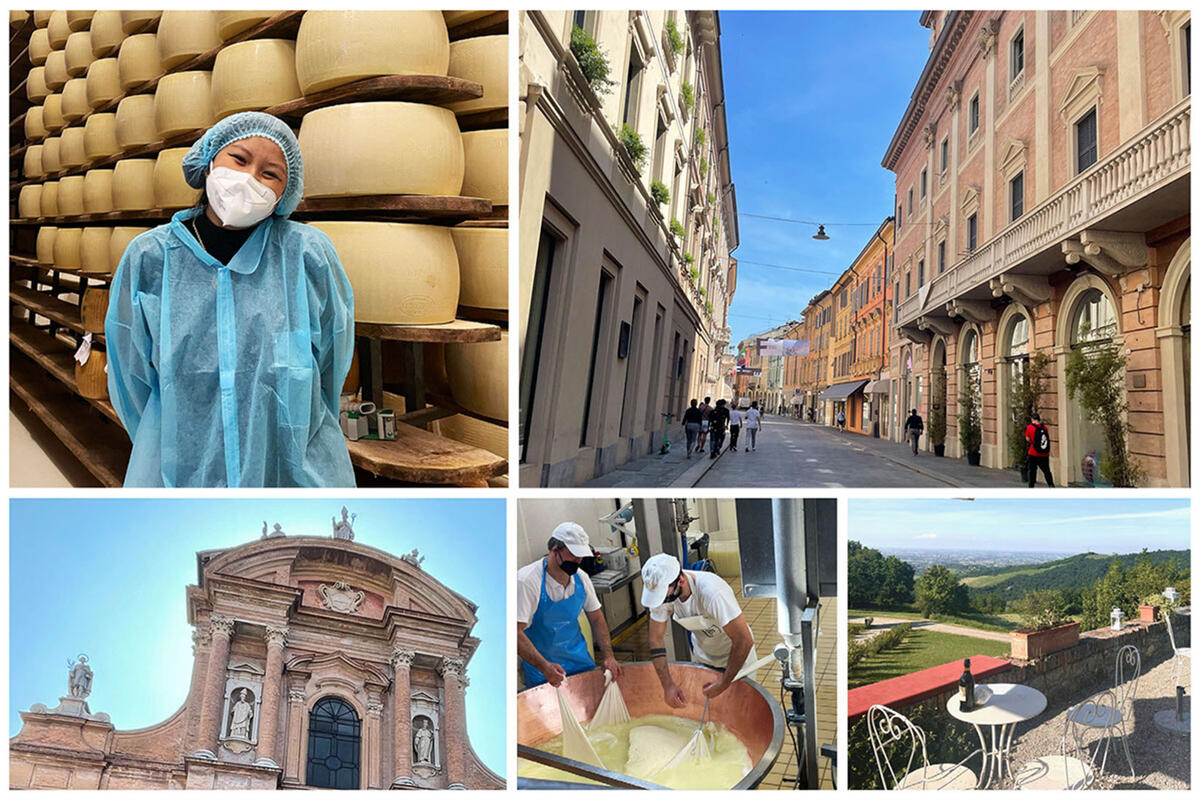Caren Yap is a rising senior in UNLV’s Lee Business School, double-majoring in marketing and international business with a focus on economics, as well as a double minor in global entrepreneurship and Brookings Public Policy. She is UNLV’s former student body president and continues to represent UNLV by serving as a summer fellow for the National Public Policy and International Affairs program at the University of Minnesota. A part of Cohort 11, Caren and her classmates are sharing insights from the group’s trip to Italy, where students are gaining hands-on experience in international entrepreneurship.
After 24 hours of flights and bus rides, Cohorts 10 and 11 of the Lee Business School’s Global Entrepreneurship Program finally stepped foot into Reggio Emilia, a beautiful city in northern Italy. The two days of visiting varying local businesses and roaming the streets in search of the perfect pizza were topped off with surreal blue skies and the beaming sun.
Upon arrival, we ate dinner together at Ostello Della Ghiara – a student hostel located in the heart of the city connected to the Basilica della Ghiara, a church built in the early 1600s. With a stunning view, we were served a multiple-course homemade meal of authentic dishes from Reggio Emilia, including spinach tortellini, cannolis and erbazzone, a savory pie typically served in the summertime.
Aside from the delicious food, on our walk to the restaurant, during our meal and our trek back, we immediately noticed a few key cultural differences.
It’s very normal to stare. Those who reside in Italy are curious and will often stare for an amount of time that Americans might consider off putting or stand offish. However, it’s nothing personal and in fact, is quite normal!
Food is everything. Food is a love language. Even something as simple as not finishing your plate or accepting more can be taken as the dish not meeting your expectations. But it’s really difficult to not clean your plate when the food’s as tasty as this!
It’s colorful. The buildings are each their own shade of pastels and browns that made their own collections of cohesive streets and alleyways.
After dinner it was off to bed to adjust to the nine-hour time difference and rest up for the busy days that remained.
So cheesy
The next morning we had the opportunity to witness the makings of what Reggio Emilio and Italy as a whole are known for: cheese. More specifically, Parmigiano-Reggiano.
We were able to see each process of cheese being made, along with the details of manufacturing and aging. A wheel of cheese that has aged 24-months (the standard time) is 25-30 euros per kilogram, making it cost about $1,700! The factory produces a top-quality product. As each wheel ages it is worth as much as $5,000. The factory we visited makes 10,000 wheels each year, which is relatively small in comparison to the 4 million wheels of cheese produced annually. It is a carefully made product that has existed for almost a millennium, from the grass-fed cows to the branding on each wheel. It is so exclusive and high in demand that only a few regions are even allowed to produce it.
Then, it was off to watch the makings of an Italian classic on the hillside, balsamic vinegar. We learned of the patient process needed to produce such a meticulous product, from the wood vinegar barrels are made of to the amount of time the vinegar is aged. Watching the breath-taking views from the family-owned estate was beyond words.
The next day was one of our last stops in this wondrous city, Re-Generation, a recycling center that repurposes waste. From opera collectives, where the community collaborates to create art, to a public book exchange that mimics a library, the impact of such a center has inspired several other versions of Re-Generation to pop up across the globe, from Spain to Argentina! There is a clear sense of community in this city, one that is united by shared interests and unique differences.
From a business perspective, there is a greater respect and honor for food and tradition. Many of Reggio Emilia’s most iconic food traditions continue to be made not just because of demand, but also to uphold tradition and to maintain a strong reputation. The history of each business, along with the sweeping city views have given each of us a more well-rounded perspective into the city’s culture. Strolling down a street, casually surrounded by 500-year-old buildings with gelato in my hand and bicyclists everywhere is something I still can’t quite wrap my head around.
Reggio Emilia, you have already taught us tons about Italian culture and cuisine, and now, we’re off to the world-famous city of Turin.
Until next time, ciao!!
And meanwhile, read an earlier dispatch from the Global Entrpreneurship cohort.



